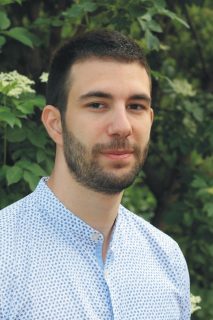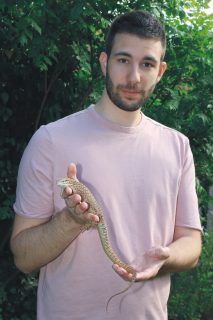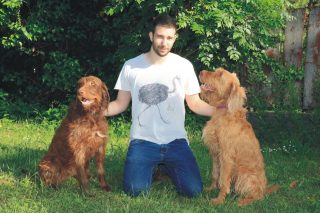This might be the first interview in our magazine without mentioning the names of any courses or subjects. Árisz Ziszisz talked about something even more important: the university community, how its strength was manifested in organizing the online student concert and how it motivated him, a former biology student, to keep trying to get into the veterinary training programme until he succeeded. Here’s an excerpt from our interview with him.
– In 2020, it’s quite obvious that you use online sources when you prepare for a conversation. I recall an elegant picture of you wearing a bowtie, and I can associate it with last year’s student presentation contest and the National Veterinarian Day; two events where you held a scientifically sound lectures. Eventually, I found another video that prompted me to ask the next question. How can a prospective vet benefit from having magician’s skills, for example, being able to throw and catch several small balls?
 – Let me specify it, though: this is juggling. Magicians take out rabbits from a hat, or coins from behind your ear. I am not at all well-versed in the latter. I don’t know how being able to throw and spin objects could help me in my veterinary career. I had been toying with the idea of choosing a stage career for quite a while. I practised, my friends and I travelled in Hungary with our fire juggler show, but it’s still a question in my mind if this could have any role in my future.
– Let me specify it, though: this is juggling. Magicians take out rabbits from a hat, or coins from behind your ear. I am not at all well-versed in the latter. I don’t know how being able to throw and spin objects could help me in my veterinary career. I had been toying with the idea of choosing a stage career for quite a while. I practised, my friends and I travelled in Hungary with our fire juggler show, but it’s still a question in my mind if this could have any role in my future.
– How could you bear the spring semester when you were not allowed to visit the university?
– It was very hard. The first few weeks were especially miserable. I like going to places, taking action, participating in the work of the exotic department. I was missing the university activities and the community really badly. After all, it’s great to be a member in a team where all the faces are familiar.
– In your experience, are there any benefits of studying at home?
– I could listen to the lectures at my own pace. When it comes to online course materials, you can rewind the more complicated parts, which is good for students. Of course, I know teachers are annoyed by having to speak to a monitor and they miss the feedback from their students. We could fill volumes if we wanted to list all the indirect effects of the coronavirus. One such consequence is related to the number of participants in a course, which is often limited by the capacity of the room. On the other hand, online courses are not limited, all students can take it up if they want.
– How did you keep in touch with the other students?
– I didn’t keep any personal contact with them because I live in the same household with my grandmother in District 17, and I wanted to protect her health as much as I could. The more free time was of course tempting. I could’ve gone “shadowing” in surgery practice or ride along with vets. Some friends invited me to join them at any time, which would’ve allowed me to drop in for some exciting wild animal care cases. I had to say no to these offers this time. Of course, we often had online consultations.
– So much so, that even the vet student concert was not cancelled!
– I handed over the organization of this year’s event to third-year student Zoltán Danyi, who I worked with last your to hold the concert. He had just created the full programme when the pandemic broke out. It seemed we’d have to put it off to next year but then the idea popped out Zoli’s and Dr Jázmin Luca Erdélyi’s head. They are the ones to be credited for organizing and holding the online concert. In the meantime, I got a call from Pisti, now to be addressed as Dr István Sarkadi, with whom we had arranged and organized the event for years. He suggested we mustn’t let this year’s student concert pass without us. We fully agreed on that.
– You soon committed yourself to animals as you started working as a volunteer in the Budapest Zoo and Botanical Garden.
– As a result, I’ve had an emu with a broken leg at home, and I raised an orphaned alpaca, too. My interest in reptiles is a bit more recent. We built a house in 2007 and I got a new room. Looking around in a pet store, I saw an iguana on a tree trunk, and I thought he would look great in my room. Back at home however, I soon realized that an animal expected to grow to a size of 1.5 metres was not compatible with any room. Listening to my parents’ advice, I went to the zoo to gain some experience. It went so well that I have spent many afternoons and summers there; I’ve been a regular at the institution for over 10 years. After my first year as a volunteer, I built a terrarium, bought my first 3 geckos, and I have a fairly large collection now.
– Do you envision your future in the world of reptiles?
– Yes. Gender determination with positive contrast media was my SSA (Scientific Students’ Associations) research topic. I’m proud that we were the first to conduct this test on many species. I will go on with this project but I’m interested in several other directions as well. I want to be a practising vet who also publishes. I’m glad that they’ve listened to my opinion several times when it came to reptile care.
 – There’s something we haven’t talked about: you were actually admitted to István Street twice.
– There’s something we haven’t talked about: you were actually admitted to István Street twice.
– I was first enrolled in the biology major. After the first semester however, I felt that I was more and more drawn to the veterinary training. So I submitted my application for the second time, too. Unfortunately, I was only admitted on my third attempt. Due to some unsuccessful exams, I had to delay a few subjects in the second and the third years so now I am a fourth-year student even though I should be in my fifth year. I am very much looking forward to graduation and starting to work. What can I say? I’ve had to learn the hard way that you need to prioritize your university tasks over many other things. I had to make a list of priorities, which allowed me to pave an easier way to my diploma. I got a lot of help from my teachers, fellow students and, of course, my family. As a biology student, a got to meet a lot of people who told me quite a few stories. They told me who, how and why could persevere even if they weren’t admitted for the first time. They all agreed it was the best decision in their lives to keep trying getting into the university.
Interview was made by Gusztáv Balázs.
